Super Tuesday Exit Polls
A breakdown of some Republican primaries.
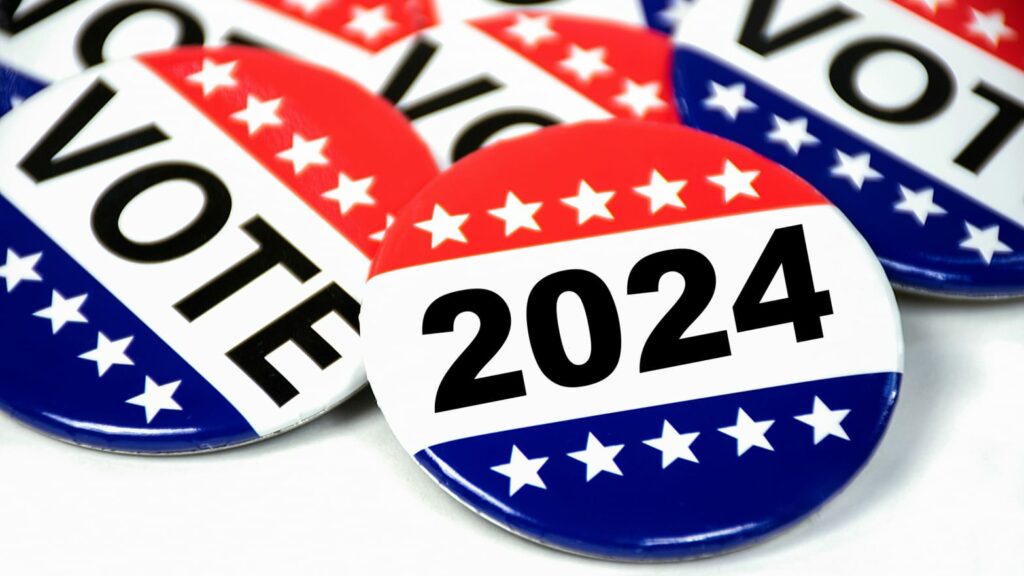
The Washington Post has an interesting compilation of graphics showing “How different groups voted on Super Tuesday primary, according to exit polls.”
No surprises here:
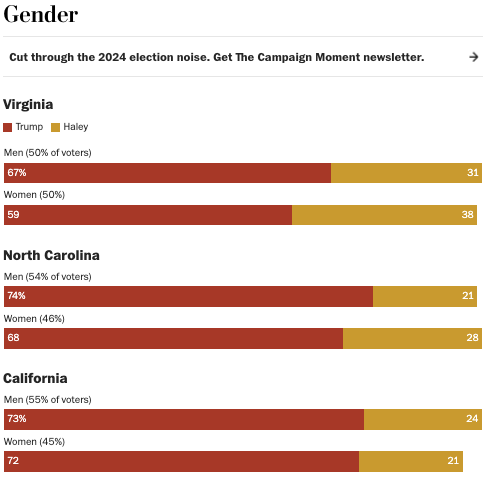
About two-thirds of men in Virginia and three-quarters in North Carolina supported Trump over Haley, according to preliminary exit polling, while Trump’s support was lower among women in both states. In California, similar majorities of men and women supported Trump.
Aside from some unexplained state-by-state variation, Trump did better with men than with women but still won both overwhelmingly.
I’m not really sure what to make of this:
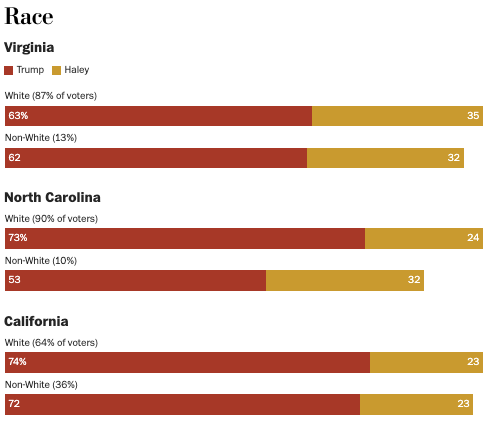
About 9 in 10 voters in the Republican primaries in Virginia and North Carolina on Tuesday were White, along with a smaller majority of California primary voters, according to preliminary exit polling data. There wasn’t much of a gap in support for Trump between White and non-White Republican primary voters in Virginia or California. In North Carolina, Trump had support from over 7 in 10 White voters and over half of non-White voters.
That Trump is somewhat more appealing to Whites than non-Whites overall is hardly a shock. But I don’t knon what it means in terms of the relatively small numbers who would show up for an essentially uncontested Republican primary eight months before the general election. Or why the results would be so starkly different in the bordering purple states of Virginia and North Carolina.
This is at least somewhat surprising:
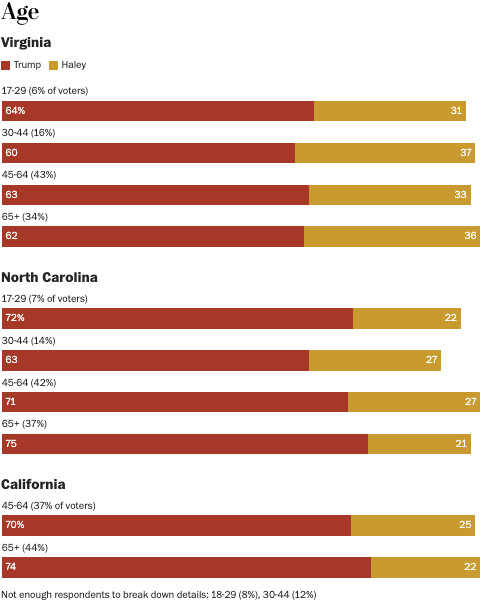
Majorities of every age group in Virginia and North Carolina supported Trump over Haley, according to early GOP primary exit polling. Sample sizes were too small in California to break out all age groups.
I would have expected Haley to be considerably more popular with younger cohorts. Not only is she less obnoxious on the social issues but she’s a generation younger than Trump. But the numbers are almost exactly even across the generations.
Not surprising but perhaps interesting:
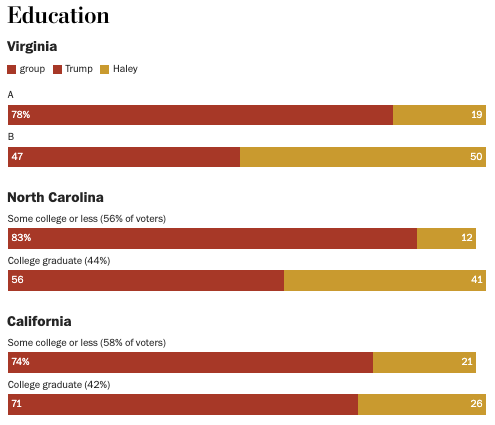
Around half of Virginia GOP primary voters had at least a four-year college degree, and they split roughly evenly between Haley and Trump, while Trump won about 8 in 10 voters without four-year degrees, according to early exit polls. In North Carolina, over 4 in 10 GOP primary voters had a college degree, and Trump won over half of those voters, alongside over 8 in 10 voters without a college degree. In California, Trump won handily among voters with and without college degrees.
Here, we see the national split reflected in the GOP primary. But considerably less so in California.
I was confused about the California results before seeing this, which made all of the results more interesting—and also rather suspect:
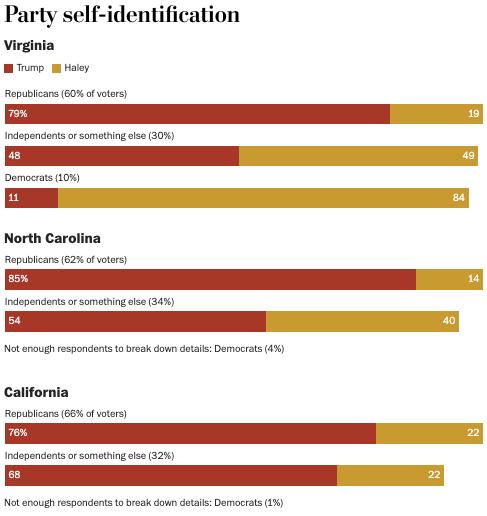
About 6 in 10 voters in the Virginia and North Carolina GOP primaries identified as Republicans, according to early exit polling, along with about two-thirds in California. Roughly 3 in 10 called themselves independent or something else in all three states, and fewer said they were Democrats. Virginia is an open primary state, so voters can choose the primary in which they want to participate.
Large majorities of self-described Republicans supported Trump in all three states, while independent voters roughly split their votes in Virginia and a majority supported Trump in North Carolina and California.
So, the polls aren’t particularly representative of Republican sentiment and, in particular, anti-Trump sentiment. Those who self-identify as Republican overwhelmingly voted for Trump. In all three states surveyed here, a third or more of the GOP primary voters were non-Republicans.
In my home state of Virginia, 10% were self-identified Democrats. I’m intrigued as to their motivation. They overwhelmingly supported Haley, which could be a sincere expression of preference and an attempt, however futile, to make the general election a choice between two non-authoritarian candidates. Or maybe they thought voting for Haley would signal Trump’s weakness and somehow hurt his chances in November. Who knows?
As for myself, I skipped the contest for the first time in memory. In 2020, I voted in the Democratic primaries for the first time and cast my vote for Joe Biden, who of course won. In 2016, I cast my last vote in a Republican primary, casting a ballot for John Kasich with dim hope that the race could be narrowed down to Trump and a single non-Trump candidate. Given two non-competitive races this year, I didn’t bother. (As noted in previous posts, Virginia’s state and local races are all in off-off years. And there are no competitive Congressional races, either.)
There are a plethora of other questions that I won’t break down. Two presented without comment:
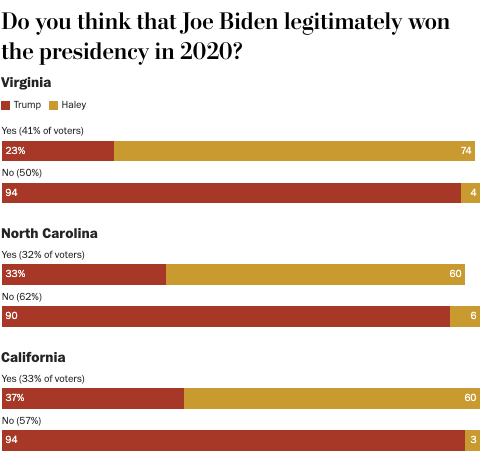
and
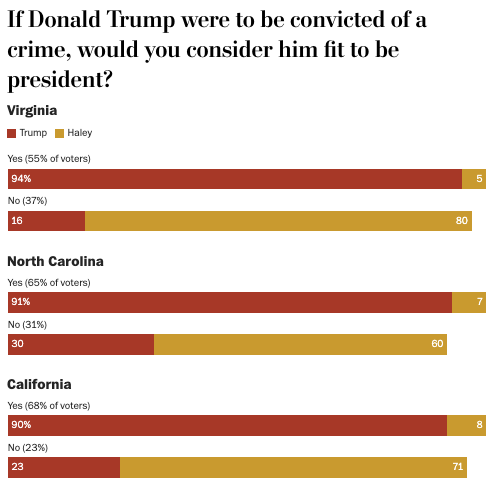

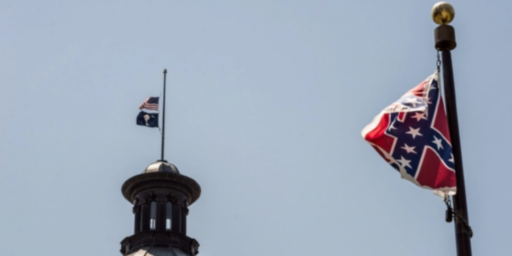
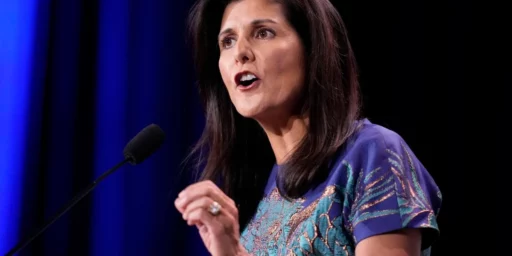
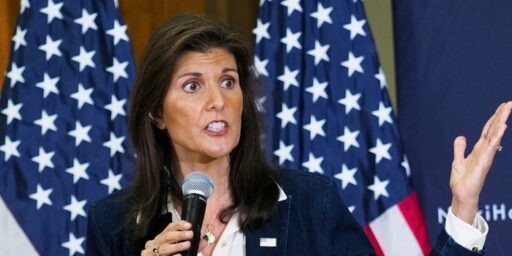
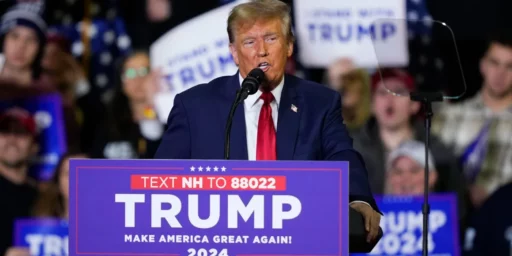
Hispanics (of any race) are much likelier to vote Republican than blacks, and California has a lot more Hispanics than blacks, with the disparity probably even greater within the GOP (though I’m sure the majority of CA Republicans are non-Hispanic white).
I’m a little curious as to how Indian-Americans view Haley, even though I know the number within the GOP primary electorate must be so low as to be negligible.
My intuition here is that none of these results can be taken at face value, in that they all mostly are driven by self-selection into primary voting. In a year when everyone knows who the two candidates will be come November, who still votes in a primary? Hint: it is not a random sample of eligible voters, or likely voters, or Republicans, or anything else.
Am I reading that right, that 90%+ of people who voted for Trump in one of these primaries believe that Biden didn’t actually win the 2016 election? I sincerely hope that this is also an artifact of self-selection…
The “convicted of a crime” comment shows the people who showed up were MAGA. It’s cult logic is on display pretty clearly. Most people would not want a convicted criminal as POTUS but their logic goes that Trump cannot commit a crime, only be slandered as such. Thus any “conviction” isn’t true and is a politically motivated hit job. A second one should have been “If any candidate was convicted of a crime, would you consider them fit to be President?”. if there was a disparity between the two questions, it would go to show the double standard his voters have and how far they are willing to let things go.
California is a bit different in that only registered Republicans could vote in the Republican presidential primary. Apparently some register as Republicans but consider themselves independents. The senate, House, etc. were open primary ballots
@KM:
Part of the problem you have is that it is expected that Trump will be “convicted” by the hostile jury pools of DC and NYC. However, it also projected that the convictions won’t survive appeal.
So to have Donald Trump convicted for a good portion of the electorate, you have to survive all the appeals. Then voters will likely consider it.
@JKB:
Hey, if you’re going to use weasel words, at least have them be grammatically correct. Or are you referring to a Professor It?
Assuming California follows the pattern typical of other vote by mail states, this may be the last presidential cycle where exit polls mean anything there.
Young Republicans are some of the most obnoxious, smug, virulently proto-fascist freaks out there.
These are the people who spend their time discussing how unfair it is that white people can’t say the n-word when black people say it all the time. They are the “Men’s Rights Activists” and the “Western Culture Enthusiasts.” These are the people who will write long diatribes about how women are naturally worse at math because in hunter gatherer societies, women gathered berries and men hunted with spears and spears require an innate understanding of calculus.
I’m honestly surprised they weren’t more Trumpy than the rest.
The “2020 was stolen” and “convicted” questions really drive home two points:
1. Trump is pretty repellant to those who don’t believe (or aren’t willing to parrot) his most blatant lies.
2. A horrifying number of Republicans are willing to go along with the lies.
For instance, JKB’s comment shows that for certain people “conviction” isn’t really conviction. From which I assume that he/she/they also believe that the entire system is rigged and cannot be trusted — courts, elections, weather patterns, hem lines, the Oscars… all of it.
@Gustopher:
Yep. When I was an undergrad, the leader of the Young Republicans was Harry Davis. When I was in grad school, it was Leonard Leo. (No link required.) It’s a tell.
It’s always remarkable how people suddenly become aware of the issue of hostile and biased jury pools when someone they care about is on trial. Imagine if they extended these concerns to the rest of the jury trials that occur in the US.
Of course, that would also require us to discuss how few criminal cases actually go to trial.